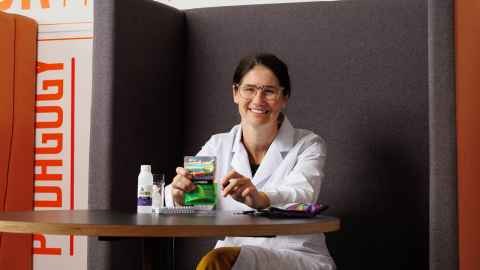Shining a new light on nits
4 June 2024
Busy staff member, entrepreneur and mum Kate Ricketts has launched a business that tackles the scourge and stigma of headlice.

After turning a novel idea into a business, professional staff member Kate Ricketts is encouraging others working at the University to scratch their entrepreneurial itch.
Kate is the University’s Schools and Community Outreach Manager – a role that involves attracting high-achieving high school students to study at the University. She’s also the founder of ISpy Nits, a company that helps parents get rid of nits from their children’s hair, while sparking kids’ interest in science and removing the stigma of head lice.
Juggling her own business, a full-time job and parenting duties can be pretty hectic, admits Kate, who says “there’s just not enough hours in the day” but she wouldn’t have it any other way. And although she’s always had an entrepreneurial bent, the true motivation for her business was born from frustration.
“I have two boys and they were constantly getting head lice,” she says. “And, because I’m a single mum, it was a real challenge to afford treatment all the time.”
Kate developed a non-toxic hair powder that makes nits glow in the dark when viewed under UV light. Although nits can be treated with a special shampoo (which ISpy Nits also sells), if any eggs remain, the lice can return weeks later. Kate’s ISpy Nits Glo-Powder makes it easier to find and remove any lingering eggs that might be lying latent to avoid another outbreak. It also shows a nit outbreak in a new light for children.
“It helps destigmatise the idea of head lice, reframing it by highlighting the science, fun, and glow-in-the-dark aspects of the experience. So children are able to have real conversations and try to reduce some of the ostracism and stigmatisation that happens as a result of head lice.”
Kate came up with the idea after reading an article stating that anti-theft powder could cause insect exoskeletons to biofluoresce. Kate remembered using a similar technique to search for ringworm in animals when she previously worked as a vet nurse, and wondered if it could be applied to nits. After ordering some powder online and giving it a whirl on her children’s hair, she knew she was on to something.
Children are able to have real conversations and try to reduce some of the ostracism and stigmatisation that happens as a result of head lice.
That instinct was confirmed when she entered her idea in the Centre for Innovation and Entrepreneurship’s (CIE) Velocity $100k Challenge. After making the final and taking out the social category in 2022, she earned a place in CIE’s VentureLab, a half-year incubator programme that helped Kate take her idea from pie in the sky to viable business.
“You might have a great idea, but it doesn’t mean you’re going to wake up and be an expert in logistics, freight forwarding, importing or anything like that.”
Kate says CIE – as well as UniServices, which provided seed funding – made a “world of difference” and she credits the centre for giving her the skills and confidence to bring her idea to life. She wishes more University staff – both professional and academic – would embrace the opportunities CIE offers: “It should be one of the perks of working here, right?”
But launching her business was only the start for Kate, who now has to focus on the nitty-gritty aspects of running a company, such as wading through the red tape associated with selling a medical-related product.
She is also working with schools to make the product more accessible to vulnerable communities, and to use a nit outbreak as a learning opportunity for students through its science education packs.
The product has been recognised with a UN Sustainable Development Goal innovation award. And with ISpy Nits’ expansion into Australia on the cards later this year, it’s unlikely things will get quieter for Kate any time soon.
James Fyfe
This article first appeared in the June 2024 edition of UniNews.